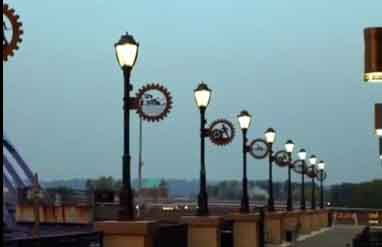Company Admits New ‘Smart’ Street Lights Can Analyze Voices, Track People
To aid Homeland Security in “protecting its citizens"

The company behind a new ‘smart’ street lighting system which is being rolled out in major cities like Las Vegas admits that the technology has the capability of analyzing voices and tracking people, features that will aid the Department of Homeland Security in “protecting its citizens.”
We first reported on Intellistreets bragging of its product’s “homeland security” applications back in 2011, with the backlash from privacy advocates causing the company to remove a promotional video from YouTube. The video was later restored (see above), although comments were disabled.
However, Illuminating Concepts, the company behind Intellistreets, seems to be more comfortable in acknowledging the “security” aspects of its devices now that it has secured numerous lucrative government contracts to supply street lighting in several major cities.
A page on the Intellistreets website which highlights “benefits and applications” features a section on security wherein it is admitted that the hi-tech system includes “voice stress analyzers,” amongst several other sophisticated sensors that “assist DHS in protecting its citizens and natural resources.”
The ability to record street conversations is merely one special feature of the Intellistreets lighting system, which is linked back to a central data hub via a ubiquitous wi-fi connection. The ‘smart’ street lights can also act as surveillance cameras, make loudspeaker security announcements (See Something, Say Something), as well as track “RFID equipped staff,” which could be any of us given the increasing amount of clothing and products which are RFID tagged.
The company’s website highlights how the system is now being installed in areas of Las Vegas, Chicago, Detroit, Auburn Hills, Asbury Park, and at stadiums like the Mercedes Benz Superdome in New Orleans.
As we reported on Sunday, the Las Vegas Public Works Department has begun testing the devices although they denied they would be used for surveillance, at least for the time being.
Authorities in New York City also recently announced that they would be replacing the city’s 250,000 street lights with new LEDs by 2017, although it is not known how many of these if any will be provided by Intellistreets.
As we reported earlier, Intellistreets are just one component of a huge network of microphones embedded in everything from games consoles to gunshot detectors that are beginning to blanket our streets and dominate our home life.
A 2012 New York Times report on ShotSpotter audio sensors, which are installed in at least 70 major US cities, acknowledged that they can and have been used to record conversations on the street.
The next level of NSA snooping, which will rely on systems like Intellistreets to record people’s conversations and detect antagonism or political extremism, will make the recent revelations of whistleblower Edward Snowden pale in comparison, and represents the potential for a ubiquitous wiretapping system that outstrips George Orwell’s worst nightmare.
Paul Joseph Watson is the editor and writer for Infowars.com and Prison Planet.com. He is the author of Order Out Of Chaos. Watson is also a host for Infowars Nightly News.
Facebook @ https://www.facebook.com/paul.j.watson.71
FOLLOW Paul Joseph Watson @ https://twitter.com/PrisonPlanet

